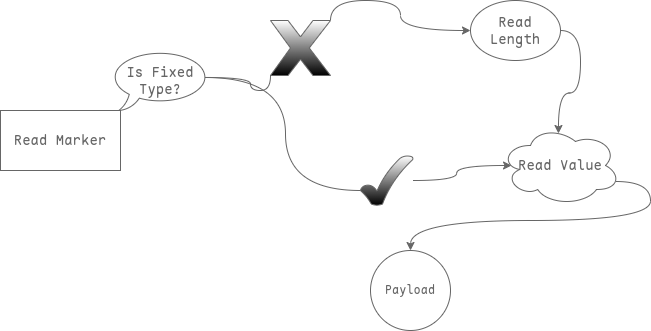Zig Msgpack
Preface
MessagePack is an efficient binary serialization format. It lets you exchange data among multiple languages like JSON. But it’s faster and smaller. Small integers are encoded into a single byte, and typical short strings require only one extra byte in addition to the strings themselves.
It’s fast and a typical use case is in neovim and redis! For neovim, it is used to as remote rpc protocol.
MessagePack spec : github
Zig Msgpack : Github
Theory

The implementation plan of this protocol is that the header is a one-byte mark to indicate the type of data to be transmitted next. If it is a non-fixed length, it will be followed by a few bytes to indicate the length, and then the data.
Here is a very simple schematic for reading a simple type:

The types supported:
Nil, Bool, Int, Float, Str, Bin, Array, Map, Ext (Predefined timestamp types)
Usage
According to github add the package to zig.
zig-msgpack provide a generics function call Pack to build the read type used.
Like this:
const bufferType = std.io.FixedBufferStream([]u8);
const pack = msgpack.Pack(
*bufferType,
*bufferType,
bufferType.WriteError,
bufferType.ReadError,
bufferType.write,
bufferType.read,
);
Through, we can get a type called pack
We use FixedBufferStream as the writetype and readtype, Pack accepts 6 parameters:
fn Pack(
comptime WriteContext: type,
comptime ReadContext: type,
comptime WriteError: type,
comptime ReadError: type,
comptime writeFn: fn (context: WriteContext, bytes: []const u8) WriteError!usize,
comptime readFn: fn (context: ReadContext, arr: []u8) ReadError!usize,
) type
It looks very similar to std.io.writer.GenericWriterand std.io.GenericReader, the design of zig-msgpack here references them.
This type pack contains methods for reading and writing the msgpack type, we can use the pack.init(write_context, read_context) to get a variable.
But since zig does not distinguish strings separately, a separate type Str is defined:
pub const Str = struct {
str: []const u8,
pub fn value(self: Str) []const u8 {
return self.str;
}
};
/// this is for encode str in struct
pub fn wrapStr(str: []const u8) Str {
return Str{ .str = str };
}
For message pack Bin type:
pub const Bin = struct {
bin: []u8,
pub fn value(self: Bin) []u8 {
return self.bin;
}
};
/// this is wrapping for bin
pub fn wrapBin(bin: []u8) Bin {
return Bin{ .bin = bin };
}
For message pack Ext type:
pub const EXT = struct {
type: i8,
data: []u8,
};
/// t is type, data is data
pub fn wrapEXT(t: i8, data: []u8) EXT {
return EXT{
.type = t,
.data = data,
};
}
zig-msgpack provides multiple ways to write and read, and strict type checking will be performed on the parameters to ensure that no non-read failure errors will occur during runtime.
For example, we write two bool value, and read them:
var arr: [0xffff_f]u8 = std.mem.zeroes([0xffff_f]u8);
var write_buffer = std.io.fixedBufferStream(&arr);
var read_buffer = std.io.fixedBufferStream(&arr);
var p = pack.init(
&write_buffer,
&read_buffer,
);
const test_val_1 = false;
const test_val_2 = true;
try p.write(.{ .bool = test_val_1 });
try p.write(.{ .bool = test_val_2 });
var val_1 = try p.read(allocator);
defer val_1.free(allocator);
var val_2 = try p.read(allocator);
defer val_2.free(allocator);
try std.testing.expect(val_1.bool == test_val_1);
try std.testing.expect(val_2.bool == test_val_2);
Overall, we convert the read result into the Payload type and obtain the value. This allows us to directly obtain data of unknown structure.
For more examples, check out the unit tests of zig-msgpack.